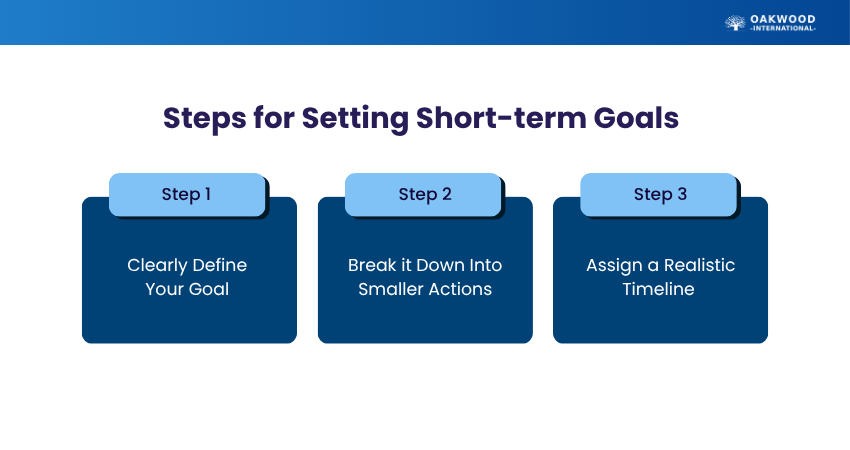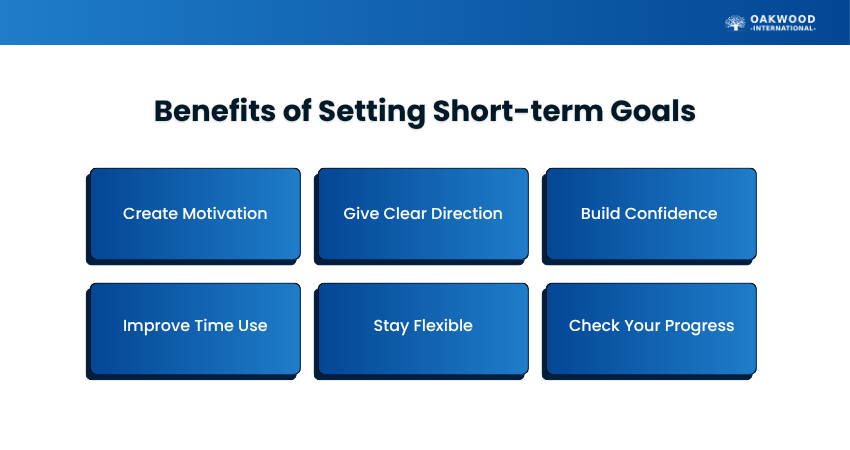Table of Contents


Have you ever set a big dream like getting promoted, buying a house, or starting your own business, only to feel stuck because it seems too far away? We’ve all been there. The truth is that big wins don’t happen overnight. They happen through small, steady steps. That’s exactly what Short-term Goals are all about: turning huge dreams into tiny, doable actions that keep you moving forward.
In this blog, we’ll explore what are Short-term Goals, how to set them, career goal examples, benefits, and how goals differ from aspirations. By the end, you’ll see how small daily actions can turn into big life-changing results.
Table of Contents
1) What is a Short-term Goal?
2) How to Set Short-term Goals?
3) Short-term Career Goal Examples
4) Benefits of Setting Short-term Goals
5) Goals vs Aspirations
6) Conclusion
What is a Short-term Goal?
A Short-term Goal is a short-term strategy you want to complete quickly. It can take a few days, weeks or months, but normally less than one year. These Short-term Goals are clear, simple and easy to monitor.
Short-term Goals often follow the SMART rule:
a) Specific: Clear and direct
b) Measurable: You can check progress
c) Achievable: Something you can really do, not too big
d) Relevant: It should help your bigger dream. Like reading to improve your knowledge
e) Time-bound: It has a finish date. Like “by the end of this month”
These Short-term Goals are small steps. For example:
a) If you want to run a marathon, start by jogging 20 minutes a day this week
b) If you want to buy a car, save £50 this month
c) If you want a better job, learn one new skill in three months
How to Set Short-term Goals?
Setting Short-term Goals becomes easier when you follow a clear process. Here are three simple steps to make your goals specific, practical, and effective using a Digital Marketing example to show you how it works.

Step 1: Clearly Define Your Goal
Without clarity, goals can feel vague and hard to measure. Make sure your objective is specific and realistic so you know exactly what you’re working toward.
For Example:
a) Set a goal like “Increase website traffic by 20% in the next 30 days”
b) Instead of “I want more traffic,” make it measurable and time-bound
Clear Goals and Objectives make it easier to stay focused, motivated, and connected to your bigger career or personal plans.
Step 2: Break it Down Into Smaller Actions
Great goals can feel overwhelming if you try to tackle them all at once. Breaking them into smaller steps makes progress manageable and keeps you moving forward.
For Example:
a) Publish two blog posts each week on trending topics
b) Run a daily Social Media campaign that drives traffic to your website
c) Launch a Google Ads campaign and test two new audiences
Dividing your goal into smaller actions turns a large challenge into a series of simple steps that you can track and celebrate along the way.
Step 3: Assign a Realistic Timeline
Without deadlines and targets, even the best goals can stall. Assign a timeline to each step so you can stay accountable and avoid delays.
For Example:
a) Write and publish the first blog post by Thursday
b) Launch the advertisement campaign at the start of next week
c) Schedule all Social Media posts for the month by Friday
Timelines ensure steady progress, prevent procrastination, and give you a sense of accomplishment as each task gets completed.
Step up your management skills. Register for our CMI Level 5 Diploma in Management and Leadership today!
Short-term Career Goal Examples
Career growth does not happen overnight. Short-term career goals can help you move forward step by step. Here are ten Short-term Goals examples:
1) Improve Your Performance Metrics
Set a clear goal to do better at work. This could mean finishing tasks on time, making more sales or giving better service. Small but steady improvements show growth and help you move toward bigger roles.
Example: If you work in sales, aim to increase your monthly sales by 10%. If you’re in customer service, try to reduce response time or improve satisfaction ratings.
2) Learn a New Skill or Concept
Learning something new is always useful. It could be a work skill like Excel, a creative skill like design, or even better speaking skills. New skills make you stronger in your job and open new opportunities.
Example: Register in an online Excel course or join a communication workshop to improve presentation skills.
3) Take on an Additional Project
Try to join one extra project at work. It shows you are willing to learn and take responsibility. It also helps you gain new experience and get noticed by your manager. Taking on extra projects can also build new skills and expand your career options.
Example: Volunteer to help your team with a new client project or offer to coordinate a small event in your department.
4) Practice Work-life Balance
Your career goals should also include balance. Decide to log off on time, take regular breaks, or spend time with family. This keeps you healthy, happy, and more focused at work. A balanced routine also improves your long-term productivity and helps prevent burnout.
Example: Avoid checking work emails after 7 PM or plan weekend activities that help you relax, like hiking or reading.
5) Find a Mentor
A mentor is someone experienced who guides you. Make it a goal to find one and talk with them often. Their advice can help you grow faster and avoid mistakes. A good mentor can also open doors to new opportunities in your career.
Example: Ask a senior colleague in your company for monthly guidance sessions or connect with an industry expert on LinkedIn.
6) Get Promoted
Many people set the short-term goal of getting promoted. To do this, find out what skills you need, improve your work, and show that you are ready. Keep track of your progress so others see your efforts.
Example: If you’re an Assistant Manager, aim to take on small leadership duties to prepare for a full managerial position within six months.
7) Explore New Job Opportunities
Sometimes the next step is outside your current company. A short-term goal could be to update your CV, apply for new jobs, or attend interviews. This can bring better pay, growth, or new experiences.
Example: Update your LinkedIn profile and apply to at least three new roles each week that match your career goals.
8) Build Your Professional Network
Meeting new people can help your career. A short-term goal could be joining a work group, attending an event, or connecting with people on LinkedIn. Networking opens doors for learning and opportunities.
Example: Attend one industry seminar this month or join an online professional group related to your field.
9) Clarify Your Long-term Career Direction
If you don’t know your future path, start small. Talk to people in jobs you like, do some research, and list what interests you. This short-term goal helps you understand what you want for the future.
Example: Schedule informational interviews with professionals in your desired field or take a career assessment test.
10) Step Into a Leadership Role
You don’t need a title to lead. Take charge of a small task or project. This short-term goal builds confidence, shows leadership, and prepares you for bigger roles later. It also helps others see your potential and trust you with more responsibility, while inspiring the team to grow alongside you.
Example: Lead a small project team at work or volunteer to mentor a new employee to develop leadership experience.
Start your managerial growth with our CMI Level 5 Award in Management and Leadership – Register now!
Benefits of Setting Short-term Goals
Short-term Goals make big dreams feel smaller and easier. They keep you motivated, focused, and moving forward step by step. Each small success makes you believe in yourself more. You start to feel capable of handling bigger challenges, and your progress can also motivate the team to perform better.

a) Create Motivation:
When you finish a small goal, you feel good. This happiness pushes you to keep going and work on the next goal.
b) Give Clear Direction:
Short-term Goals show you what to do now. They keep you on the right path and stop you from wasting time.
c) Build Confidence:
Each small success makes you believe in yourself more. You start to feel capable of handling bigger challenges.
d) Improve Time Use:
Because Short-term Goals have deadlines, they help you plan your day and focus on what really matters.
c) Stay Flexible:
If things change, you can easily adjust Short-term Goals. They allow you to fix your plan without losing progress.
d) Check Your Progress:
After reaching a goal, you can stop and see how far you’ve come. If something didn’t go as planned, you can change your direction.
Goals vs Aspirations
It’s easy to mix up Short-term Goals and aspirations, but they are not the same.
a) Goals are clear, specific, and something you can act on now. For example: “I will finish an online course in three months.”
b) Aspirations are broad dreams you hope to reach in the future. For example: “I want to be successful in my career.”
Aspirations show you the big picture of where you want to go. Goals are the small steps that help you get there. By setting Short-term Goals, you make your aspirations real and achievable.
Conclusion
Short-term Goals turn big dreams into simple steps you can achieve. They help you stay focused, build confidence, and improve your skills while showing steady progress. By setting clear and realistic goals, you can make a roadmap that keeps you motivated and guides you smoothly toward long-term success. Start small today, and you’ll see big results tomorrow.
Boost your leadership career with our CMI Level 5 Training – Register today!


 Back
Back



 Back to Catagories
Back to Catagories





 + 44 7452 122728
+ 44 7452 122728










